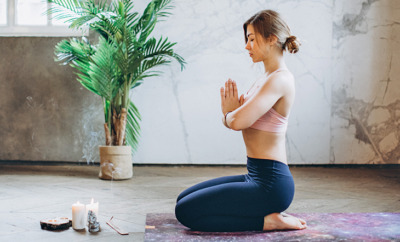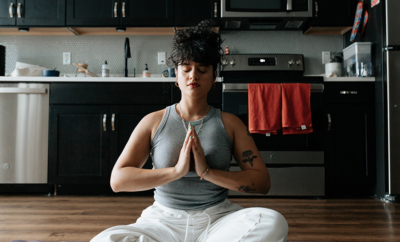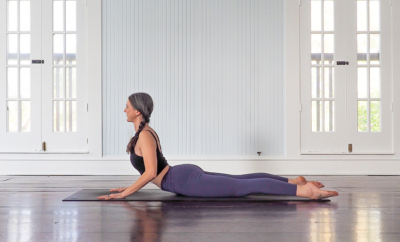A Guide to the Yamas: The First Path of Yoga’s Eight Limbs

Think of the Yamas and Niyamas like the guidelines of your path to happiness – the “how-to” for gaining the skills and wisdom needed to change your attitude, thoughts and beliefs to better navigate your life. How to truly live your yoga practice off the mat and in your life.
The Yamas are the first path of yoga’s Eight Limbed Path, as explained in the Yoga Sutras by Patanajali. The Niyamas, the second path of the Eight Limbs, are: purity, contentment, self-discipline, self-study and surrender.
The Yamas are: non-violence, truthfulness, non-stealing, non-excess, and non-possessiveness.
The Yamas and Niyamas originated from the ancient text of Patanjali’s Yoga Sutras. Learning about the Yamas and Niyamas forever changed how I navigate through life by studying myself and how I can better live a meaningful and more purposeful life.
The word Yamas is a Sanskrit word meaning “restraints.” These restraints, or Yamas, are broken down into five main elements of achieving: non-violence, truthfulness, non-stealing, non-excess, and non-possessiveness.
Our awareness is directed to our ethics, integrity and how we show up for our lives. They’re the path to self-control.
A great resource to learn about the Yamas and Niyamas is the book Yamas and Niyamas: Exploring Yoga’s Ethical Practice.
Here Are the 5 Yamas Explained:
1. Non-Violence (Ahimsa)
This is the opportunity for you to look at the way you treat and talk to yourself and those around you. You’re being invited to look at how you are contributing to either the cruelty and kindness in the world.
How we treat others is a direct reflection of how we are treating ourselves – like a mirror to who we truly are.
“When we fulfill our function, which is to truly love ourselves and share love with others, then true happiness sets in.” – Gabrielle Bernstein
Take a moment and reflect on how you can reduce harm to yourself and others by practicing compassion and kindness – remembering that only love is real.
How to apply Ahimsa to your daily life: Live your yoga by reducing thoughts and actions in your life that are causing you pain, hurt and “violence.”
This could be anything from: negative thoughts, not believing in yourself, pushing too hard in your yoga practice, waking up to a loud “violent” alarm, not supporting or loving your fellow humans, etc.
2. Truthfulness (Satya)
Truthfulness asks us to look at how we are living and speaking with complete honesty. This doesn’t mean that the truth is the easy option – in fact, speaking the truth to ourselves and others is often very difficult.
Think beyond telling the truth of the surface level things (how much you spent on something, do you like your friend’s haircut, will you go to the party you were invited to) and go deeper . . .
Are you truly happy? Do you feel like something is missing? What are you longing for?
Truth demands personal integrity. And this is so much more than not telling a lie.
When we speak the truth – to ourselves and to others – we expand and we grow – we break free. This Yama encourages us to search for the truth in ourselves. Because when we are truthful and honest with ourselves and live a life that is truly authentic, we are more happy, fulfilled and, able to live our life’s purpose.
How to apply Satya to your daily life: Consider what lies or untrue thoughts you’re telling yourself. Again, go deeper with your questions. Perhaps it’s acting a certain way because that’s what you believe you need to be – even if it’s not really who you are. By doing this, we are living a lie – we are not our true self.
3. Non-Stealing (Asteya)
Going beyond the surface level definition of not stealing (from people or the earth), we are being asked to shift our focus to what it is that we are possibly stealing without even realizing it.
We can steal from ourselves by comparing, not feeling worthy enough, being fearful of trying something new, and so on. We can steal from others by not truly listening to their needs, not acknowledging their successes because of jealousy, or even stealing their time by showing up late.
When we focus on our own growth instead of comparing and focusing on others, we are giving back to the world instead of stealing from it.
How to apply Asteya to your daily life: Non-stealing is asking us to maintain an equal respect of ourselves and others’ lives. Asteya invites us to stop stealing from our own happiness by clinging to the fear, doubt or worry in our life.
To dig deep and reflect on where we put up barriers in our lives including: self-sabotage, perfectionism and low self-esteem – and to instead shift the focus on more positivity.
4. Non-Excess (Brahmacharya)
This Yama is asking us to find true, real balance and recognize when the balance has turned into excess.
Excessiveness can happen when having a special treat becomes necessary to be fulfilled. It begins to shift from something we enjoy, into something we believe we need to be truly satisfied. Let’s be clear – life is meant to be enjoyed and full of pleasure.
This Yama is definitely not asking us to remove pleasure from our lives – but instead to be fully present in the moment of pleasure and not needing more than necessary.
“Are you eating the food, or is the food eating you? Are you watching Netflix or is Netflix watching you? Can you receive pleasure without it turning into needing more?” – Deb Adele
How to apply Brahmacharya to your daily life: Observe where in your life, home and habits you can release the excess to make room for the things you actually love and what truly brings you pleasure.
5. Non-possessiveness (Aparigraha)
Everything we possess makes it harder for us to not want more. The invitation of this Yama? To let go of the need to have things/materials in our possession, including expectations for our own lives.
When we remain attached to things like what we believe about ourselves, how we feel others should be, and what our lives should look like, it makes it difficult to continue to learn and grow.
The clutter that is surrounds us, particularly physically (think closets, garages, our living space) is a reflection of how we are holding onto things in our lives, thoughts and beliefs. When our minds are cluttered with thoughts of worry, fear and ego, this can manifest itself in our physical environment.
When we have the urge to clean, organize or donate our belongings, this is a reflection of a thought, belief or situation that we are ready to let go of.
When we practice letting go or releasing attachments, we find peace. This Yama reminds me of a quote from Deepak Chopra, “When you expect nothing, nothing ever goes wrong.”
How to apply Aparigraha to your daily life: Can we have something without the need to have more? We are being encouraged to do an inventory of our lives, to note our success by how much we have.
Are we holding onto these things so tightly that they are actually holding us back? Can we de-clutter and let go of thinking something should be a certain way? By doing so, we can gift ourselves the ability to not want, and to truly believe that what we have is enough.
The Takeaway On the Yamas
Overall, the Yamas are like a personal map to where we are going in our life journey.
The Yamas give us a chance to observe our relationship with ourselves and guides us into strengthening our roles with daily practice, observation and self-reflection.
And of course: how to truly live your yoga off the mat and in your life.
Ready for the Second Path of the Eight Limbs? Learn All About the Niyamas Here!


This Month's Letter
From the Editor
Monthly motivation and food for
thought from our founder.































Comments